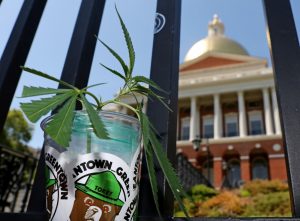
Massachusetts real estate transfer fees could lead to losses in Boston, other cities, towns: report
A new report on real estate transfer fees indicates that Boston and other Massachusetts communities could lose up to 60 cents for every dollar in new taxes collected if they win state approval and go forward with implementation.
The Greater Boston Real Estate Board, in partnership with the Building Owners and Managers Association and Tufts University, highlighted the finding in a report issued Thursday, urging state lawmakers to pursue alternative housing solutions.
Eighteen cities and towns across the Bay State are waiting for action from the state Legislature on their respective “real estate transfer fee” proposals, with revenue generated from the fee directed to affordable housing development.
Gov. Maura Healey also wants to add a real estate transaction fee of 0.5% to 2% on property sales over $1 million, or the county median home sale price, as the state continues to grapple with its affordable housing crisis.
The governor’s request is part of a $4 billion bond bill her administration released last October. The fee, projected to affect fewer than 14% of all residential sales, would be paid by the seller of the property.
The Greater Boston Real Estate Board contends in its report that cities and towns considering a 2% tax – Boston, specifically – would have “produced an offsetting loss of nearly 60 cents for every dollar collected” on sales last year.
“Massachusetts needs meaningful solutions to the housing crisis and this research should tell the Governor, legislators and local leaders that new taxes won’t work,” board Chairman Mike Edwards said in a statement. “The Commonwealth must avoid passing misguided policies like transfer taxes and instead focus on workable solutions that promote new housing.”
The report cited a 2019 analysis commissioned by the City of Boston that found a 1% transfer tax would lower property values by 1% and reduce the number of sales – a takeaway that the authors say stresses the need for communities to “balance any expected tax gains against potential expected losses.”
Boston Mayor Michelle Wu is trying to impose a 2% tax on real estate sales that exceed $2 million, with the seller incurring the fee and proceeds payable to the city.
Officials would then deposit the money into a neighborhood housing trust, for the purpose of furthering housing acquisition, affordability, creation and preservation, and senior-homeowner and low-income-renter stability.
The state Executive Office of Housing and Livable Communities indicated earlier this year that Massachusetts could have raised $392 million for each 1% levied and $784 million under a 2% levy if all 351 cities and towns had transfer fees in fiscal year 2022.
Boston could have raised $70 million with a 1% levy, the state housing office found.
The fees have garnered support from officials from 29 municipalities who signed onto a letter to Democratic legislative leaders last month, urging them to pass local-option taxes.
“Transfer fees alone will not solve our housing crises,” a portion of the letter states, “but taken together with state investments and other policy changes, transfer fees will allow us to invest local money in our local challenges and deliver better results for residents.”
Authors behind the report opposing the measure say state lawmakers should consider expanding current policies to “streamline the creation of affordable and market-rate housing units” and “reforming policies such as Proposition 2 ½ to exempt affordable housing initiatives from counting towards the tax collection cap.”
“Massachusetts needs to build tens or perhaps hundreds of thousands of housing units to meet demand, so it is key that policymakers understand the right ways – and the wrong ways – to address this crisis,” said Evan Horowitz, executive director of the Center for State Policy Analysis at Tufts University.


